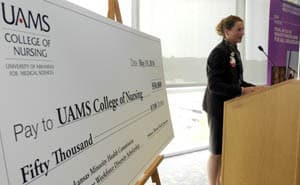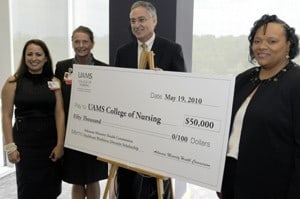UAMS College of Nursing Awarded $50,000 from Arkansas Minority Health Commission
May 19, 2010 | In an effort to address a shortage of minority nurses teaching in the state’s nursing programs, the Arkansas Minority Health Commission (AMHC) is donating $50,000 to the University of Arkansas for Medical Sciences (UAMS) College of Nursing’s Ph.D. nursing program. The AMHC Healthcare Workforce Diversity Scholarship fund will provide financial assistance to minority UAMS College of Nursing graduate students who are in need of financial aid. “We are thankful to the commission for committing these ongoing funds,” said Claudia Barone, Ed.D., R.N., dean of the UAMS College of Nursing. “At UAMS we work very diligently to increase the number of minority students represented in all of our programs. This scholarship will significantly aid our efforts toward reaching those goals.” Idonia Trotter, executive director of the AMHC, spoke about the endowed scholarship at a ceremony today that also featured Barone and UAMS Chancellor Dan Rahn, M.D. “This is all about recognizing the need to address the dire shortage of minority, graduate prepared nurses teaching in the state’s nursing school programs,” Trotter said. “Today is a landmark day in taking a big step forward to ensure we’re moving toward reversing that trend. I’m very proud to be a part of this and look forward to seeing this scholarship’s intentions come to fruition.” The mission of the AMHC is to ensure all minority Arkansans access to health care that is equal to the care provided to other citizens of the state and to seek ways to provide education, address issues and prevent diseases and conditions that are prevalent among minority populations. The goal is to bridge the gap in health issues among minorities and the majority. |

